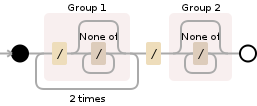Similar to a question posted here, am looking for a solution in Java.
That is, how to find the index of nth occurrence of a character/string from a string?
Example: "/folder1/folder2/folder3/". In this case, if I ask for 3rd occurrence of slash (/), it appears before folder3, and I expect to return this index position. My actual intention is to substring it from nth occurrence of a character.
Is there any convenient/ready-to-use method available in Java API or do we need to write a small logic on our own to solve this?
Also,
If your project already depends on Apache Commons you can use StringUtils.ordinalIndexOf, otherwise, here's an implementation:
public static int ordinalIndexOf(String str, String substr, int n) {
int pos = str.indexOf(substr);
while (--n > 0 && pos != -1)
pos = str.indexOf(substr, pos + 1);
return pos;
}
This post has been rewritten as an article here.
I believe the easiest solution for finding the Nth occurrence of a String is to use StringUtils.ordinalIndexOf() from Apache Commons.
Example:
StringUtils.ordinalIndexOf("aabaabaa", "b", 2) == 5
Two simple options occur:
charAt() repeatedlyindexOf() repeatedlyFor example:
public static int nthIndexOf(String text, char needle, int n)
{
for (int i = 0; i < text.length(); i++)
{
if (text.charAt(i) == needle)
{
n--;
if (n == 0)
{
return i;
}
}
}
return -1;
}
That may well not perform as well as using indexOf repeatedly, but it's possibly simpler to get right.
You can try something like this:
import java.util.regex.Matcher;
import java.util.regex.Pattern;
public class Main {
public static void main(String[] args) {
System.out.println(from3rd("/folder1/folder2/folder3/"));
}
private static Pattern p = Pattern.compile("(/[^/]*){2}/([^/]*)");
public static String from3rd(String in) {
Matcher m = p.matcher(in);
if (m.matches())
return m.group(2);
else
return null;
}
}
Note that I did some assumptions in the regex:
As requested in a comment, I'll try to explain the regex: (/[^/]*){2}/([^/]*)

/[^/]* is a / followed by [^/]* (any number of characters that are not a /),(/[^/]*) groups the previous expression in a single entity. This is the 1st group of the expression,(/[^/]*){2} means that the group must match extactly {2} times,[^/]* is again any number of characters that are not a /,([^/]*) groups the previos expression in a single entity. This is the 2nd group of the expression.This way you have only to get the substring that matches the 2nd group: return m.group(2);
Image courtesy by Debuggex
If you love us? You can donate to us via Paypal or buy me a coffee so we can maintain and grow! Thank you!
Donate Us With